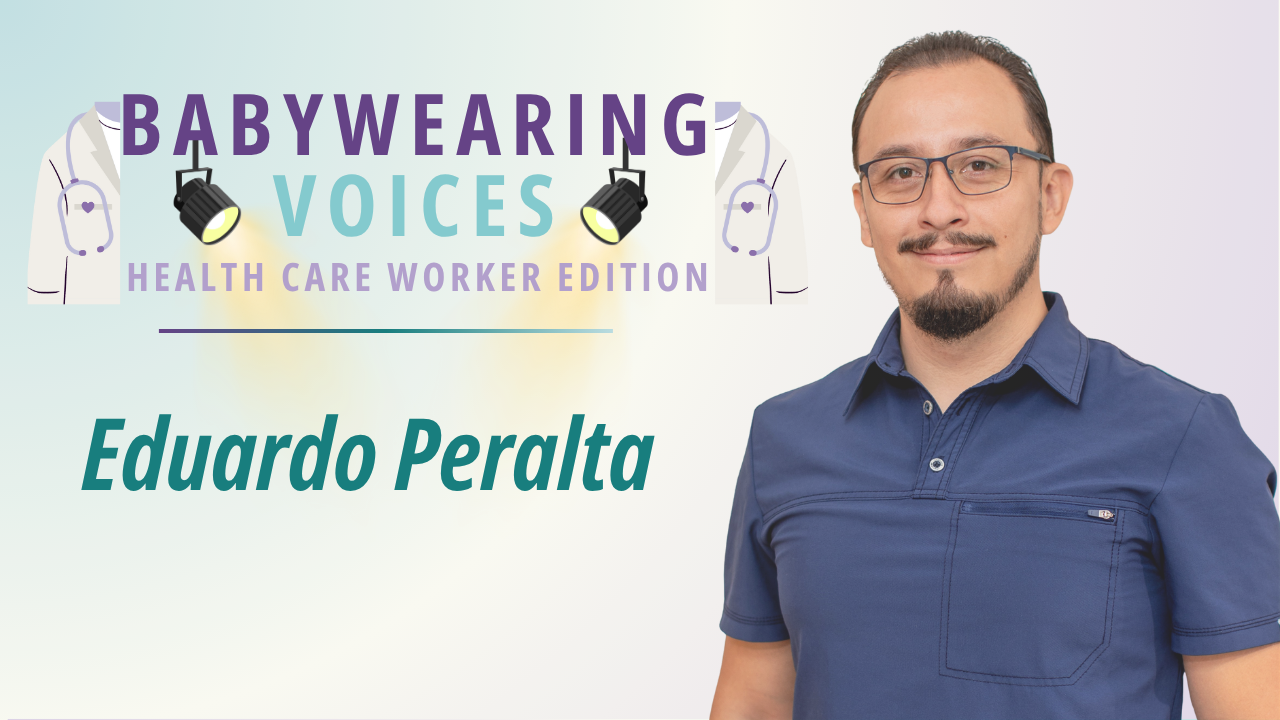Babywearing Voices: Eduardo Peralta
Jul 21, 2025
Eduardo Peralta didn’t set out to become a babywearing educator and healthcare worker specializing in NICU support and kangaroo care. But through his curiosity, commitment to learning, and dedication to families in need, he has found himself at the forefront of an emerging movement in Latin America. His journey from simply wanting to understand baby carriers to becoming a trusted figure in hospital settings is a story of passion, adaptation, and tireless advocacy for both parents and newborns.
Discovering Babywearing
Eduardo’s babywearing journey began when he first wore his own child in a baby carrier. Living in Bolivia at the time, he became involved with a local baby carrier manufacturer, where his interest in babywearing really took root. His curiosity about the mechanics of babywearing and his desire to ensure safety led him to pursue more formal training. Eventually, he enrolled in the CBWS Foundations in Babywearing Education Training.
What drew him in was the hands-on, practical approach. As someone who had previously completed other certifications, he expected this course to be like many others—focused on lectures and solo learning. But what he encountered was an interactive, peer-driven environment that allowed students to engage in small groups, share insights, and build confidence together.
Several of his peers remain close colleagues to this day.
This camaraderie among students surprised him and made a lasting impression. Eduardo fondly remembers the bonds he formed, noting that several of his peers remain close colleagues to this day. Beyond the relationships, Eduardo also gained a deeper appreciation for the course's thorough approach to safety incidents and babywearing risks. Studying safety incident reports, for instance, opened his eyes to an area of babywearing that he hadn’t previously considered—and it sparked a deeper curiosity.

An Unexpected Path: Kangaroo Care
Eduardo’s curiosity truly bloomed during a class discussion on stretchy wraps and their use in kangaroo care. He hadn’t heard of the method before, but something about it struck a chord. Kangaroo care, which involves skin-to-skin contact between parents and premature infants, fascinated him, and he dove headfirst into researching everything he could find on the subject.
“Something about kangaroo care struck a chord.”
That thirst for knowledge led Eduardo to enroll in a post-graduate diploma course on kangaroo care in Colombia. With this specialized training, Eduardo has since become a vital advocate for using kangaroo care and babywearing in healthcare settings, particularly in Neonatal Intensive Care Units (NICUs). His work focuses on supporting parents and helping them bond with their newborns through skin-to-skin contact and babywearing, offering both physical and emotional benefits for infants in critical care.
A Unique Role in the NICU
Currently, Eduardo works closely with public hospitals, particularly in NICUs, providing guidance on kangaroo care, skin-to-skin contact, and breastfeeding support. As both a babywearing consultant and a lactation educator, he equips parents with the tools and confidence they need to care for their fragile newborns. In his work, Eduardo emphasizes attachment, comfort, and security as key elements to helping parents and infants find regulation and calm during stressful NICU stays.
As a certified childcare specialist, Eduardo is responsible for newborn care in hospitals, often assisting in labor rooms and helping with a newborn’s first skin-to-skin contact or breastfeeding session. His knowledge of hip dysplasia, gained through additional certifications and self-directed study, has become another key aspect of his work. Eduardo is passionate about ensuring that babywearing consultants are well-equipped to support families dealing with hip dysplasia or other medical conditions. He believes this deeper understanding of anatomy and physiology should be a greater focus in babywearing education.

Advocating for Babywearing in Latin America
Eduardo is passionate about reclaiming the traditional and cultural babywearing practices of Latin America. He points out that babywearing has deep roots in the region, with indigenous communities historically using it as a natural way to bond with infants. Today, Eduardo sees his work as a continuation of that legacy, helping modern families reconnect with these ancient practices.
“Babywearing is an act of love.”
For Eduardo, babywearing isn’t just about convenience—it’s about connection. He often finds himself encouraging fathers in Latin America to embrace babywearing, reminding them that wearing their babies can not only help them bond with their children but also make them better dads. His message is clear: babywearing is an act of love, one that nurtures both parent and child.
Eduardo’s journey has taken him from an intrigued student to a leading educator and advocate for babywearing and kangaroo care. As he continues to work closely with hospitals and expand his expertise in childcare, Eduardo remains committed to supporting families, especially those in critical conditions. He has exciting plans for the future and is passionate about continuing to make babywearing, kangaroo care, and attachment-focused parenting more accessible to all families in Latin America.
Eduardo’s story is one of perseverance, passion, and a profound commitment to improving the lives of families. His work not only transforms the experiences of new parents but also honors the ancient traditions of babywearing, ensuring they are carried forward into the modern world.
💬 Want to keep up with Eduardo’s work and advocacy?
Follow him on Instagram: @eduperaltan

💬 Want to keep up with Eduardo’s work and advocacy?
Follow him on Instagram: @eduperaltan
Want to read more?
Explore these spotlights from the Babywearing Voices series.
Babywearing Voices: Lisa Grisham
Reflecting on bridging cultures, centering caregivers, and how babywearing is personal and political.
Babywearing Voices: Meaghan Pa
A conversation on advocacy, self-awareness, and finding your rhythm as a babywearing educator.
Babywearing Voices: Banner Hospital System
How a hospital initiative redefined care and community by centering contact, culture, and babywearing.


